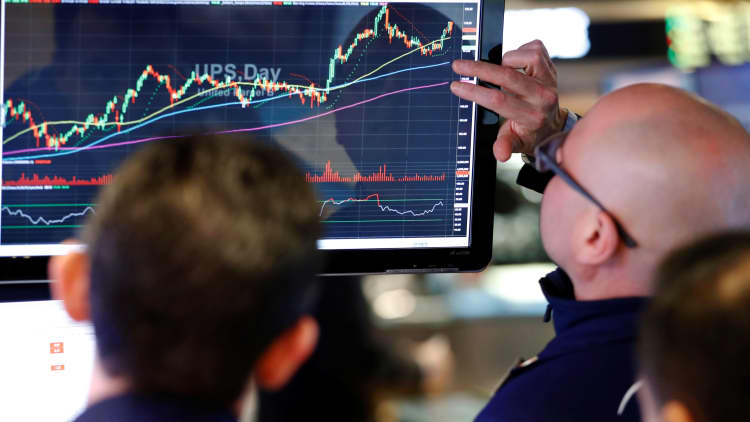
U.S. equities posted their worst day of the year Tuesday as banks faced pressure from falling yields, while investors turned their eyes to a key House vote.
The Dow Jones industrial average fell around 240 points, with Goldman Sachs contributing the lion's share of the losses. The S&P 500 dropped 1.2 percent, with financials falling more than 2.5 percent to lead decliners. The indexes were also posted their first decline of at least 1 percent since October.
"We're settling back into the middle of the range in the 10-year yield. That certainly has taken the air out of financials lately," said Art Hogan, chief market strategist at Wunderlich Securities.
U.S. Treasury yields traded mixed, with the benchmark 10-year note yield holding around 2.42 percent and the short-term two-year note yield trading around 1.26 percent.
Yields have been falling since last week, when the Federal Reserve raised rates but provided a more dovish outlook than expected.Weaker yields lead to lower interest rates on loans, which hurt financial stocks, particularly banks.
"I'm not overly worried about [financials'] price action today," said Mark Spellman, portfolio manager at Alpine Funds, noting that the economic backdrop remains bullish for the sector.
The SPDR S&P Bank ETF (KBE) and the Regional Banking ETF (KRE) both fell more than 4.5 percent.
10-year yield in 2017
Source: FactSet
The Nasdaq composite reached a fresh all-time high before closing 1.8 percent lower. Shares of Apple hit an all-time high after the firm announced a new version of its 9.7-inch iPad and special editions for the iPhone 7 and iPhone 7 Plus.
The small-cap Russell 2000 underperfomed, falling around 2 percent.
Retail stocks also took a hit Tuesday, as the SPDR S&P Retail ETF (XRT) dropped nearly 2 percent after Rep. Kevin Brady, the Republicans' chief tax writer in the House, told CNBC that a border adjustment tax will probably appear in the final tax reform plan.
"Importers of course don't see the possibility of 'a very positive way' in any fashion and why the retail stocks today are getting hammered with XRT down," said Peter Boockvar, chief market analyst at The Lindsey Group, in a note.
Stocks had traded mostly sideways recently after a sharp postelection rally. Randy Frederick, vice president of trading and derivatives at Charles Schwab, said "there aren't any catalysts to take the market higher, but there aren't any to derail it either."
Entering Tuesday, the S&P 500 had risen just 0.42 percent this month, but had spiked 6 percent for 2017.
Since President Donald Trump's victory last November, expectations for tax reform, deregulation and more government spending have increased dramatically. That said, the Trump administration indicated that health care reform would take place ahead of tax reform.
"If those become bigger fights and everything gets watered down, that could be a disappointment," said Alpine's Spellman.
House Republicans are expected to vote on repealing and replacing the Affordable Care Acton Thursday.
"If we can't get health care reform soon, that doesn't mean we won't get tax reform. It just means it will come later, but the market is not priced in for that," said Wunderlich's Hogan.
The Freedom Caucus, a key group of House Republicans, threatened to issue a formal statement of opposition to the Obamacare replacement bill, which would delay the vote, unless the language in the bill changes dramatically.

Wall Street also focused on the oil market as crude prices briefly rebounded on the possibility of an OPEC supply cut extension.
"If that comes to fruition, that would be a huge plus," said Peter Cardillo, chief market economist at First Standard Financial. "I think the rebalancing in the market is going to take place in the next few months."
West Texas Intermediate futures erased gains to settle 1.82 percent lower at $47.34 per barrel. Oil has been under pressure recently as oversupply concerns pushed prices below $50, a key technical level.
Energy is the worst-performing sector this year, falling around 8 percent.
On the data front, fourth-quarter current account figures showed the deficit fell, hitting its lowest level in more than a year, as an increase in the primary income surplus offset a soybean-driven drop in exports.
Meanwhile, the Philadelphia Federal Reserve nonmanufacturing index slipped in March, but still showed overall business growth.
The dollar fell against a basket of currencies, with the euro hitting its highest level since Feb. 2, after a debate between French presidential candidates eased worries that populist Marine Le Pen would win.
"With fears somewhat receding over the political uncertainty in France coupled with the ECB slowly adopting a hawkish stance, the Euro has found itself back in fashion," said Lukman Otunuga, research analyst at FXTM. "A daily close above 1.0800 could encourage bullish investors to attack the next relevant level at 1.085."
Major U.S. Indexes
The Dow Jones industrial average fell 237.85 points, or 1.14 percent, to close at 20,668.01, with Caterpillar leading decliners and Coca-Cola outperforming.
The declined 29.45 points, or 1.24 percent, to end at 2,344.02, with financials leading 10 sectors lower and utilities the only advancer.
The Nasdaq composite tumbled 107.70 points, or 1.83 percent, to close at 5,832.53.
About four stocks declined for every advancer at the New York Stock Exchange, with an exchange volume of 1.004 billion and a composite volume of 4.25 billion at the close.
The CBOE Volatility Index (VIX), widely considered the best gauge of fear in the market, traded near 12.5, up nearly 10 percent.
—CNBC's Peter Schacknow and Reuters contributed to this report.
On tap this week:
Tuesday
6:00 p.m. Cleveland Fed President Loretta Mester
Wednesday
Earnings: Tencent, Winnebago, Five Below, Acushnet
9::00 a.m. FHFA home prices
10:00 a.m. Existing home sales
Thursday
Earnings: Conagra, Scholastic, KB Home, Accenture, GameStop, Shoe Carnival, Micron
8:30 a.m. Initial claims
8:45 a.m. Fed chair Janet Yellen makes opening remarks at Strong Foundations Conference
10:00 a.m. New home sales
12:30 p.m. Minnepolis Fed President Neel Kashkari at Strong Foundations Conference
7:00 p.m. Dallas Fed President Rob Kaplan
Friday
Earnings: Finish Line
8:30 a.m. Durable goods
8:45 a.m. Chicago Fed's Evans
9:05 a.m. St. Louis Fed President James Bullard
9:45 a.m. Manufacturing PMI
10:00 a.m. New York Fed President William Dudley


